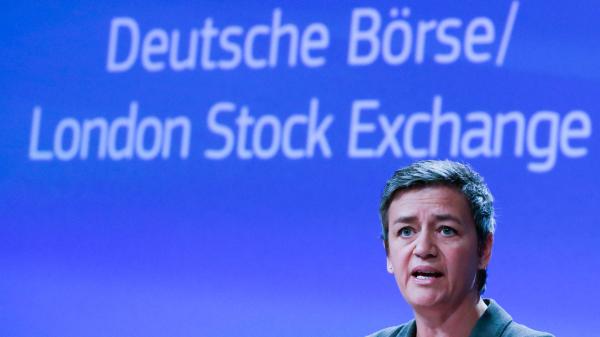
Brussels blocks £24bn London Stock Exchange merger
Europe’s top competition official has blamed the London Stock Exchange and Deutsche Börse for the failure of the companies’ £24 billion merger as she announced that Brussels had officially blocked the tie-up.
Margrethe Vestager, head of competition policy at the European Commission, said today that the two exchanges had submitted some of their proposals to keep the controversial deal alive “minutes” before the formal deadlines, leaving little time for her officials to assess their merits.
Announcing that the Commission would prohibit the merger, which would have created a European rival to the large US groups that dominate the global trading business, Ms Vestager said that allowing the combination to go ahead would have created “a de facto monopoly”.
She added: “We could not allow this merger to go ahead unless these serious concerns were addressed.”
The two sides had already committed to sell the LSE’s Paris-based financial clearing business to assuage competition concerns but the deal hit the buffers last month after it was announced that the London exchange would also have to sell MTS, its Italian government bond trading platform.
The LSE said that this was a concession too far and in her briefing this morning Ms Vestager told reporters that the exchanges had offered instead a package of “behavioural measures” to ensure that they did not abuse their new market power.
Ms Vestager said that this was too little too late.
“[The exchanges] need to meet the deadlines that apply to them and that includes providing remedies to meet our concerns,” she said. “The later we get them the less time we have to review them. The parties only produced the remedies minutes ahead of the deadline.”
She added: “The Commission cannot allow the creation of monopolies and that is what would have happened in this case and that is why we have prohibited this merger for the good of European citizens.”
In a statement to the market the LSE insisted that the remedies it had offered “would have preserved credible and robust competition in all markets”. It said that the Commission’s decision to block the deal had stopped the creation of “a world-leading market infrastructure group anchored in Europe”. It added that it would be reviewing the decision.
Deutsche Börse said in its own statement that it regretted the blocking of the deal. Joachim Faber, its chairman, warned that it would be a blow for Europe’s financial markets.
“The prohibition is a setback for Europe, the Capital Markets Union and the bridge between continental Europe and Great Britain,” Mr Faber said. “A rare opportunity to create a global market infrastructure provider based in Europe and to strengthen the global competitiveness of Europe’s financial markets have been missed.”
With the end of the deal, the LSE will no longer sell LCH Clearnet SA, its Paris-based clearing operation, to Euronext, a rival stock market operator. Stephane Boujnah, chief executive of Euronext, said, however, that it remained keen to buy the business.
Mr Boujnah said: “Euronext remains a willing buyer of Clearnet SA in the terms agreed on January 3 but in the absence of obtaining an agreement Euronext is fully committed to securing the best long-term solution for its post-trade activities in the interests of clients and shareholders.”
Shares in LSE rose 2.6 per cent to £31.01 and those in Deutsche Börse were up 1.9 per cent to €83.44.

